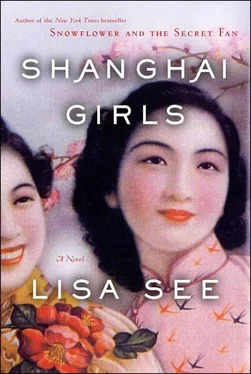No wonder she doesn’t know how to cook. She wasn’t taught by her mother, just as I wasn’t taught by mine-but for different reasons. Yen-yen has no desire for something better to eat, because she doesn’t have memories of shark’s fin soup, crisp Yangtze River eel, or braised pigeon in lettuce leaves. She’s grabbed on to old traditions-outdated traditions-in the same way I latch on to them now: as a means of soul survival, as a way to hang on to ghost memories. Perhaps it’s better to treat a cough with winter melon tea than by putting a mustard plaster on your chest. Yes, her way-back stories and her old ways are sinking into me, changing me, instilling more “Chinese” into me, as surely as the flavor of ginger seeps into soup.
“What happened after they took you?” I ask, my heart in a great sympathy of understanding.
Yen-yen stops on the sidewalk, bags filled with donations hanging from her hands. “What do you think happened? You’ve seen unmarried girls without families. You know what happens to them. I was sold as a servant in Canton. As soon as I was old enough, I became a girl with three holes.” She juts her chin. “Then one day, maybe I was thirteen, I was bundled in a sack and put on a boat. The next thing I knew I was in America.”
“What about Angel Island? Didn’t they ask you questions? Why weren’t you sent back?”
“I came before Angel Island opened. Sometimes I look in the mirror and I’m surprised by what I see. I still expect to see that girl, but I don’t like to remember those days. What do they matter to me now? You think I want to remember being a wife to many men?” She shuffles down the street, and I hurry to keep up with her. “I’ve done the husband-wife thing too many times. People make such big talk about it, but why worry so much? The man goes in. The man goes out. As women, we stay the same. Do you know what I mean, Pearl-ah?”
Do I? Sam’s different from those men in the shack, that I know. But have I stayed the same? I remember all the times I’ve seen Yen-yen sleeping on the couch. Usually some new bachelor-an immigrant from China, who appears on Old Man Louie’s partnership list until his debt is paid by someone who needs a laborer at a cheap price-sleeps there. But whenever they aren’t there, Yen-yen can be found in the main room in the morning, folding blankets and reciting one excuse or another: “That old man snores like a water buffalo.” Or “My back hurts. This place is more comfortable.” Or “That old man tells me I move around in the bed like a mosquito. He can’t sleep. If he doesn’t sleep, then everyone is unhappy the next day, no?” Now I understand that her reasons for sleeping on the couch are the same ones I had when I wished I could escape Sam’s bed. Too many men did things to her that she doesn’t want to remember.
I put a hand on her arm. Our eyes meet and something passes between us. I don’t tell her what happened to me. How can I? But I think she understands… something, because she says, “You’re lucky you have Joy and that she’s healthy. My boy…” She sucks in a long, deep breath and lets it out slowly. “Maybe I spent too long in that business. I’d worked almost ten years by the time the old man bought me. There were so few Chinese women here back then-maybe less than one for every twenty men-but he got me for a cheap price anyway because of my job. I was happy, because I finally left San Francisco and came here. But even then he was like he is now-old and stingy in heart. All he wanted was a son, and he worked hard to give me one.”
She nods to a man sweeping the sidewalk before his business. He looks the other way, afraid we’ll ask him for a donation.
“When the old man went back to his home village to see his parents, I went with him,” Yen-yen continues. I’ve heard her say this before, but this time I hear it differently. “When he traveled around China to buy merchandise, he left me behind. I don’t know what he thought: that maybe I would stay in the house for the weeks he was gone with his essence inside me, my legs up, waiting for a son to grab hold. But as soon as he left, I walked from village to village. I speak Sze Yup. My home village has to be in the Four Districts, right? Every day I looked for a village with chestnut trees and a fishpond. I never found it, and I didn’t have a son. I got pregnant, but the babies all refused to breathe the air of this world. Every trip back to Los Angeles, we reported that I had had a son in China and left him with his grandparents. This is how we brought in the uncles. Wilburt was my first paper son. He was eighteen, but we said he was eleven to match the papers we filed claiming he was born one year after the San Francisco earthquake. Charley came next. He was easy. We’d gone back to China the next year, so I had a certificate for a son born in 1908, and Charley was born that same year.”
My father-in-law had had to wait a long time for his investment-his crop-to ripen, but it had worked for him, providing cheap labor for his enterprises and easily lining his pockets.
“And Edfred?” Yen-yen smiles in amusement. “He’s Wilburt’s son, you know.”
No, I didn’t know. Until recently I had thought all these men were Sam’s brothers.
“We had a paper for a son born in 1911,” Yen-yen continues, “but Edfred wasn’t born until 1918. Edfred was only six when we brought him here, but his paper said he was thirteen.”
“And no one noticed?”
“They didn’t notice that Wilburt wasn’t eleven either.” Yen-yen shrugs at the stupidity of the immigration inspectors. “With Edfred, we said he was small and undeveloped for his age, that he’d been starving in the home village. The inspectors appreciated the idea that he hadn’t benefited from ‘proper nutrition.’ They assured me he would ‘plump up’ now that he was in his proper country.”
“It’s all so complicated.”
“It’s supposed to be complicated. The lo fan try to keep us out with their changing laws, but the more complicated they make them, the easier it is for us to trick them.” She pauses to let that sink in. “I had only two sons of my own. My first son was born in China. We brought him here and we had a peaceful life. We took him back to the home village when he turned seven, but he had an American stomach, not a village stomach. He died.”
“I’m sorry.”
“Long time ago now,” Yen-yen says, almost matter-of-factly “But I tried and tried and tried to have another son. Finally, finally , I got pregnant. The old man was happy. I was happy. But happiness doesn’t change your fate. The midwife came to catch Vernon. She could tell right away something was wrong. She said this happens sometimes when a mother is old. I must have been over forty when he was born. She had to use-”
She stops before a shop that sells lottery tickets and sets down her packages so she can shape her hands into claws. “She pulled him out of me with these things. His head was bent when he came out. She squeezed on this side and then the other to make it into a better shape, but…”
She picks up her bags again. “When Vern was a tiny baby, the old man wanted to go back to China to get one more paper son. We had the certificate, see? Our last one. I didn’t want to go. My Sam died in the home village. I didn’t want my new baby to die too. The old man said, ‘Don’t worry. You’ll nurse the baby the whole time.’ So we went to China, picked up Edfred, got on a boat, and brought him back here.”
“And Vern?”
“You know what they say about marriage. Even a blind man can get a wife. Even a man with no sense can get a wife. Even a man with palsy can get a wife. All those men have one duty and one duty alone. To have a son.” She looks up at me as pathetic as a bird but with a will as strong as jade. “Who will take care of the old man and me in the afterlife if we don’t have a grandson who will make offerings to us? Who will take care of my boy in the afterworld if your sister doesn’t give him a son? If not her, Pearl, then it has to be you, even if he is just a paper grandson. This is why we keep you here. This is why we feed you.”
Читать дальше












